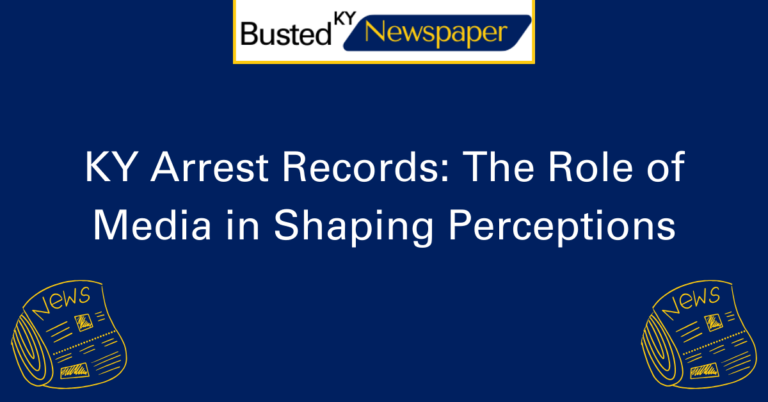The Future of Mugshot Publishing in Kentucky
Mugshot publishing in Kentucky is undergoing a significant transformation, and the future looks promising. With advancements in technology and changing public attitudes, the way mugshots are published and accessed is evolving. In this Comprehensive Guide, we will explore the current state of mugshot publishing and delve into the exciting possibilities that lie ahead.
Over the years, the publication of mugshots has generated controversy and debate. Critics argue that it can perpetuate negative stereotypes and hinder the rehabilitation of individuals. However, with the advent of online platforms and social media, the accessibility of mugshots has increased exponentially. This has led to discussions about the ethics and implications of making these images readily available to the public.
As we navigate the future of mugshot publishing in Kentucky, it is essential to consider the potential benefits and challenges that lie ahead. From increased transparency and accountability to the protection of individuals’ privacy rights, there are many factors to consider. Stay tuned as we delve into the intricacies of this complex issue and explore how it may shape the future landscape of mugshot publishing.
Evolution of Mugshot Publishing
As technology continues to advance and public attitudes shift, the world of mugshot publishing is undergoing a significant transformation. In this section, we will explore the current state of mugshot publishing and the exciting possibilities that lie ahead.
Controversy Surrounding Mugshot Publication
For years, the publication of mugshots has sparked intense debate and controversy. Critics argue that it perpetuates negative stereotypes and hinders the rehabilitation of individuals. However, with the rise of online platforms and social media, the accessibility of mugshots has skyrocketed, leading to discussions about the ethical implications of making these images readily available to the public.
The Benefits of Increased Transparency
One potential benefit of the evolving landscape of mugshot publishing is increased transparency. By making mugshots more readily accessible, it becomes easier for the public to hold individuals and law enforcement accountable. This transparency can help promote trust and ensure that those in positions of power are held to the highest standards.
Protecting Privacy Rights
While transparency is important, it is equally crucial to consider the protection of individuals’ privacy rights. With mugshots being easily accessible online, concerns arise regarding potential misuse and the impact on an individual’s reputation and future opportunities. Striking a balance between transparency and privacy will be a key challenge moving forward.
Exploring Ethical Implications
As mugshot publishing evolves, it is imperative to examine the ethical implications that come with this shift. Questions arise about the potential for undue harm, the impact on an individual’s presumption of innocence, and the potential for bias in the selection and dissemination of mugshots. These ethical considerations must be addressed as we navigate the future of mugshot publishing.
Shaping the Future Landscape
The future of mugshot publishing in Kentucky holds immense potential for change. By carefully considering the benefits, challenges, and ethical implications, we can shape a future that balances transparency with privacy, accountability with fairness, and accessibility with responsible use.
FAQ’s
What is mugshot publishing?
Mugshot publishing refers to the practice of making arrestees’ photographs, commonly known as mugshots, publicly available through various media channels. These images capture the facial features of individuals who have been arrested, typically showcasing them in a frontal and profile view. Mugshot publishing has become increasingly prevalent with the digitalization of law enforcement records and the advent of online platforms, making such information easily accessible to the public.
Why are mugshots published?
Mugshots are published for several reasons, primarily to promote transparency and inform the public about arrests made by law enforcement agencies. This serves as a deterrent by making individuals aware of legal consequences, potentially discouraging criminal activities. Additionally, publishing mugshots is part of the public record, allowing citizens to stay informed about local crime rates and law enforcement efforts. In some cases, it may also assist in locating and identifying individuals involved in criminal activities, facilitating community safety.
How has technology impacted mugshot publishing?
The proliferation of technology has significantly impacted mugshot publishing. In the digital age, law enforcement agencies can easily upload and share arrest records online, making them accessible to a broader audience. Social media platforms and specialized websites dedicated to criminal records further amplify the reach of mugshots. While this technology enhances public access to information, it also raises concerns about privacy and the potential for misuse, as individuals may be stigmatized even before being proven guilty. Moreover, the ease of sharing and replicating digital content poses challenges in controlling the spread of mugshots on the internet.
What are the potential benefits of mugshot publishing?
Mugshot publishing can serve as a valuable tool for public awareness and community safety. By making arrest information readily available, it informs citizens about criminal activities in their vicinity and fosters a sense of transparency in law enforcement practices. Furthermore, the publication of mugshots may aid in the identification and location of suspects, assisting authorities in their investigative efforts. In some cases, the public nature of mugshots can deter individuals from engaging in illegal activities, contributing to crime prevention.







